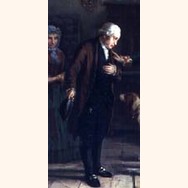Mayer Amschel Rothschild (1744-1812)
Mayer Amschel Rothschild laid the foundations on which his five sons and their descendants would build a Europe wide banking empire.
The Rothschild family trace their origins back to 15th century Frankfurt. The ancestry of the Rothschild name can be traced back to 1577 to Izaak Elchanan Rothschild, whose name derived from the house he occupied in the Frankfurt Judengasse - zum roten Schild ("at the sign of the red shield"). His grandchildren and descendants took this name as the family name and kept it when they relocated in 1664 to another house in the Judengasse which became the family's home and centre of business until the early 19th century.
Mayer Amschel Rothschild was born in 1744 in the Judengasse, one of eight children of Amschel Moses Rothschild (d. 1755) and his wife Schönche Rothschild (née Lechnich, d. 1756). Amschel's father had a business in goods-trading and currency exchange. He was a personal supplier of collectable coins to the Prince of Hesse.
With the help of relatives, Mayer Amschel secured an apprenticeship under Jacob Wolf Oppenheimer, at the banking firm of Simon Wolf Oppenheimer in Hanover, in 1757. The grandson of Samuel Oppenheimer taught Rothschild useful knowledge in foreign trade and currency exchange, before he returned to his brothers' business in Frankfurt in 1763. He became a dealer in rare coins and won the patronage of Crown Prince Wilhelm of Hesse (who had also earlier patronised his father). His coin business grew to include a number of princely patrons, and then expanded through the provision of financial services to Crown Prince Wilhelm. In 1769, Mayer Amschel gained the title of "Court Agent", managing the finances of the immensely wealthy Elector of Hesse-Cassel who became Wilhelm IX, Landgrave of Hesse-Kassel in 1785. Business expanded rapidly following the French Revolution when Rothschild handled payments from Britain for the hire of Hessian mercenaries.
By the early years of the 19th century, Rothschild had consolidated his position as principal international banker to Wilhelm IX and began to issue his own international loans, borrowing capital from the Landgrave. In 1806, Napoleon invaded Hesse in response to Wilhelm's support for Prussia. The Landgrave went into exile in the Duchy of Holstein, but Rothschild was able to continue as his banker, investing funds in London. He also profited from importing goods in circumvention of Napoleon's continental blockade. As a result of these dealings, Mayer Amschel amassed a not inconsiderable fortune and, in 1810, renamed his firm M A Rothschild und Söhne, establishing a partnership with his four sons still in Frankfurt, (his son Nathan Mayer Rothschild (1777-1836) having already established a business in Manchester and London).
Mayer Amschel Rothschild died on 19 September 1812 in Frankfurt am Main. He was buried at the old Jewish cemetery in Frankfurt, located next to the Judengasse. A park was named after him, and also a street (Rothschildallee). In 1817 he was posthumously ennobled by the emperor Francis I of Austria.
For further information about the life Mayer Amschel Rothschild (1744-1812) see Founder: Meyer Amschel Rothschild and his time, by Amos Elon (Harper Collins, London, 1996).
